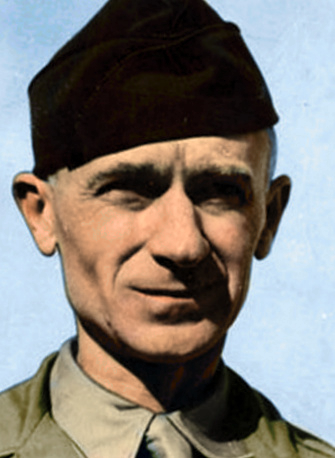The Pittsburgh Press (June 27, 1944)

Roving Reporter
By Ernie Pyle
On the Cherbourg Peninsula, France – (wireless)
For a couple of days, I rode around the Cherbourg Peninsula with Bert Brandt, war photographer for ACME Newspictures.
You may have seen by now some of the pictures Bert took during that time, so I would like to tell you how they came about.
Picture No. 1: This showed a large crowd of French people, led by the mayor of their town, advancing toward an American soldier with outstretched hands of welcome.
Well, that was taken in Barneville. The people really did welcome us, but of course the actual picture had to be staged.
The people were very pleased and eager. The soldier Bert picked out to receive the throng was Sgt. Max Monsorno of Woodhaven, Long Island. He was one of the 9th Division men left to guard the town after the others had pressed on through.
Bert instructed the crowd in its act, through the only Barneville woman who spoke English. She told them how they should advance toward the sergeant, all smiling and be sure to look at the sergeant and not look at the camera. Then Bert yelled “Go!” The mayor walked towards Sgt. Monsorno with his hand out. The crowd surged up behind him. Bert snapped a picture and then shouted at them to do it again. It seemed the mayor wasn’t smiling big enough to suit Bert.
More instructions. More interpretations. A little girl jumped up and down with delight. The older people got more excited. Sgt. Monsorno gave the mayor a colossal stage smile, to show him how.
Then Bert yelled “Go!” again, the mayor almost cut his head in two with a smile, and the little girls threw their flowers, and the whole crowd waved their arms. Everybody was very happy, including Bert. And we hope we made you very happy too.
Picture No. 2: Dead horses and wrecked German vehicles along the roadside. The circumstances were these:
We had caught the Germans trying to retreat down the road from Bricquebec to Barneville, and plastered them with artillery. The devastation along that road was immense.
The Germans were moving with many horse-drawn vehicles as well as trucks. They were in two wheeled French work carts, in fancy passenger bugles, in light wagons along the style of our own Wild West covered wagons.
At spots, the wreckages piled so high that traffic couldn’t get through until our own engineers dragged the debris off the road. Hundreds of carts and guns and dead horses littered the road. German bodies lay sprawling big holes, pockmarked the macadam, burned out trucks lay dead by the roadsides, masses have broken and entwining telephone wires snarled the highway. That was the scene when Bert Brandt took Picture No. 2.
The picture was of a bulldozer methodically pushing dead horses and spattered trucks, all in the same scoopful off a road into an orchard. The dozer driver went after his job with a grim got-to-do-it look on his face.
There were scores of pitifully dead horses within a space of a few yards. Some of them lay as if asleep. Others were in distorted, gnarled positions, their leg bones cracked and broken as the bulldozer pushed. A little bunch of French people stood looking on.
Bert took his pictures while standing on the hood of a command car in which he had been riding. I sat in the back seat, calling to him to hurry up and finish. Of all the war I’ve seen, that is the site which has come the nearest to making me sick at the stomach.
Picture No. 3: Two sweet little French girls, about six years old, throwing flowers to me as we passed them in our car. The circumstances:
We were on our way back to camp after taking the picture of the horses. We passed through a concrete roadblock Germans had built just north of Bricquebec. As we passed through to a little girl standing on top through some flowers to us, but they missed in the flowers fell on the road behind us. We had gone about 50 yards when Bert said, “Say, that would make a picture. Let’s go back and get it.”
So, we backed up, got out and indicated by sign language that we wanted the little girls to do it again. They were smart as whips. They got the idea instantly. Furthermore, there were two of the prettiest little girls you ever saw in your life.
We picked some more flowers for them. Then Bert got set in the road ahead. I got in the back seat. Bert had me put my goggles back over my eyes so that it would look as if we were going fast, although we were actually barely moving for the picture.
We had to retake the picture three times. The little girls, in their eagerness, would throw the flowers too soon. Finally, I acted as director, and as the car approached, I kept saying, “No, no, no,” and then I remembered the French word “maintenant,” which means “now,” and so at the right moment I called out “maintenant!” and they threw flowers and everything was perfect.
Then I got out of my car and I had no sooner hit the ground. Then I was attacked by my two little friends, plus half a dozen more who had arrived and who had been watching and they were all over me like a swarm of bees laughing and kissing and hugging me till I was almost smothered.
It was completely impulsive and I don’t think it had anything to do with the liberation or the war. I think it was motivated by the simple fundamental that the French like to kiss people. They don’t even care who they kiss. Vive la France!
